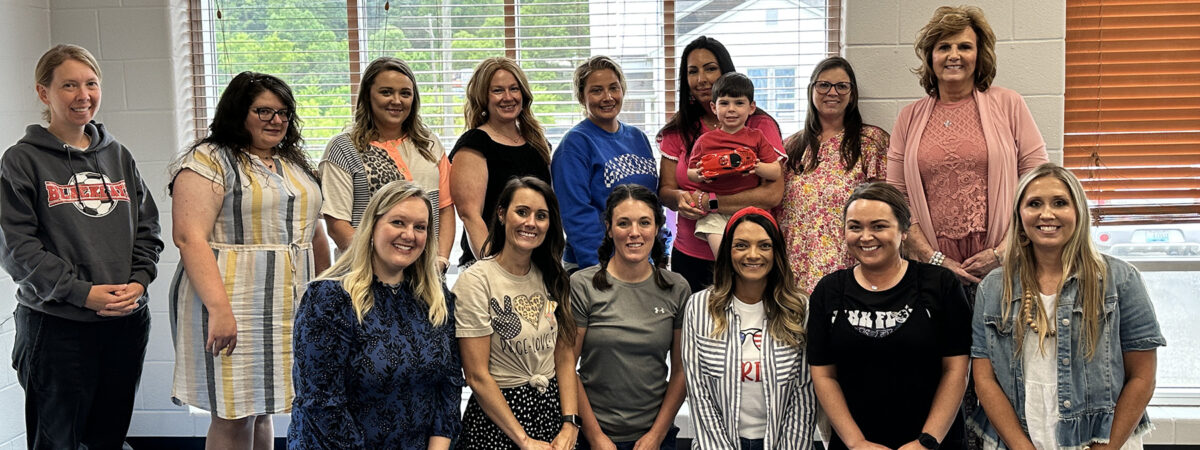
The thought of teaching computational thinking (CT) to primary age students was overwhelming to teachers in Eastern Kentucky (East KY) just a few years ago, but now two teachers are leading trainings that make the daunting responsibility of developing those skills manageable and fun! Since fall 2019, Mary Dotson (Floyd County Schools) and Markayla Stevens (Pikeville Independent High School) have participated in the Tough as Nails initiative through a National Science Foundation grant where distinguished STEAM teachers from South Fayette Township (Pittsburgh, Pennsylvania) conduct a series of summer institutes to show East KY teachers how CT concepts can be integrated into the content areas. Mary and Markayla were among several East KY teachers who, throughout the pandemic and beyond, made a series of experimental attempts to change primary level lessons from a traditional format to intentionally incorporating CT skills.
This year, when the opportunity to host a summer institute led by teacher leaders from East KY became available, these two educators rose to the challenge. An immediate goal for this training was to provide local K-5 teachers with strategies and ideas that could be adapted to any grade level and content. Additionally, this training was a big first step towards the sustainability of the Tough As Nails initiative, that aimed not only to inspire teachers and students in Floyd and Pikeville, but for this type of learning to spread across the region in a collaborative way, with leadership and initiative coming from local educators.
The training was successful on all fronts. Mary and Markayla collaborated across district lines to construct an engaging two-day institute that had 14 teachers in attendance from Johnson County, Magoffin County, and Wesley Christian school districts. The training was greatly inspired by approaches and lessons that Mary and Markayla learned over the past three years from Melissa Unger (South Fayette Township), and was well-aligned with Kentucky’s new technology standards, through support from Digital Promise. The opportunity to have a leadership role was meaningful to Mary and Markayla as well. As Mary stated on one of the training days, “This training allowed me to share my passion for student engagement with teachers in our region. I started this journey almost six years ago. It is so humbling to see our goal come full circle and teachers in our region willing to join our initiative to provide opportunities for students in Eastern KY.”
Bringing CT lessons to primary students can be easily integrated through Game Board Design. In this method, students learn decomposition and algorithmic thinking as they break down the components of a familiar game and create a new game in a step by step manner. The game boards were created using common classroom materials along with recyclables and cardboard.
Another lesson taught teachers to use glyphs that focused on the integration of art and data collection. Glyphs are visual representations of a piece of data where the attributes are expressed through artistic means. Students learn to transfer the data to bar graphs or tally charts to identify any big trends.
Teachers were also introduced to simple coding through the use of Ozobots. These little robots can be programmed through the use of colored lines that elicit an action based on the color sequence. Students learn to think algorithmically through play and simple task assignments such as creating “Noun Town.” By drawing a town, labeling all of the nouns, and creating a color coded path, the Ozobots can navigate throughout the town.

Ozobot in action
Developing CT skills is vital to the development of problem solving, as well as building a foundation for higher-level CT skills. By doing this work, we’re recognizing that students need to be introduced to CT in their primary ages to be ready for a high school level computer science course. Intentional lessons that give students opportunities to practice CT skills could be a huge factor in shaping the future of not only our students’ lives, but also our communities.
Learn more about the Drawing on Kinship: Rurally Sustaining Computational Thinking Pathways project and follow and support us on this journey with #CTKinship. You can also read about how this project and blog series originated (this is the third post in the series) in, “Rural Innovation: Community Problem-Solving Through Heritage Storytelling.”
This material is based upon work supported by the National Science Foundation under Grant No. 1923314 and No. 2219401. Any opinions, findings, and conclusions or recommendations expressed in this material are those of the author(s) and do not necessarily reflect the views of the National Science Foundation.